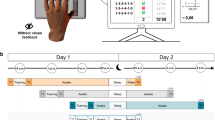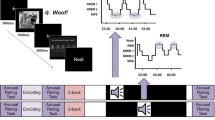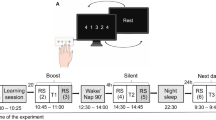Abstract
Rapid eye movement (REM) sleep has been considered important for consolidation of memories, particularly of skills. Contrary to expectations, we found that REM sleep suppression by administration of selective serotonin or norepinephrine re-uptake inhibitors after training did not impair consolidation of skills or word-pairs in healthy men but rather enhanced gains in finger tapping accuracy together with sleep spindles. Our results indicate that REM sleep as a unitary phenomenon is not required for skill-memory consolidation.
This is a preview of subscription content, access via your institution
Access options
Subscribe to this journal
Receive 12 print issues and online access
$209.00 per year
only $17.42 per issue
Buy this article
- Purchase on Springer Link
- Instant access to full article PDF
Prices may be subject to local taxes which are calculated during checkout

Similar content being viewed by others
References
Walker, M.P. & Stickgold, R. Neuron 44, 121–133 (2004).
Peigneux, P. et al. Neuroreport 12, A111–A124 (2001).
Marshall, L. & Born, J. Trends Cogn. Sci. 11, 442–450 (2007).
Smith, C. Neurosci. Biobehav. Rev. 9, 157–168 (1985).
Karni, A. et al. Science 265, 679–682 (1994).
Born, J. et al. Neuroscientist 12, 410–424 (2006).
Robertson, E.M. et al. Curr. Biol. 14, 208–212 (2004).
Nishida, M. & Walker, M.P. PLoS ONE 2, e341 (2007).
Tamaki, M. et al. Sleep 31, 204–211 (2008).
Smith, C. et al. Psychol. Belg. 44, 81–104 (2004).
McCarley, R.W. Sleep Med. 8, 302–330 (2007).
Mayers, A.G. & Baldwin, D.S. Hum. Psychopharmacol. 20, 533–559 (2005).
Amado-Boccara, I. et al. Neurosci. Biobehav. Rev. 19, 479–493 (1995).
Siegel, J.M. Science 294, 1058–1063 (2001).
Vertes, R.P. Neuron 44, 135–148 (2004).
Acknowledgements
We thank E. Wiege, I. von Lützau, H. Ruf and A. Otterbein for technical assistance and L. Marshall for helpful discussions. This work was supported by a grant from the Deutsche Forschungsgemeinschaft SFB 654 'Plasticity and Sleep'.
Author information
Authors and Affiliations
Contributions
B.R., J.P. and S.D. conducted the experiments and analyzed the data. B.R. and J.B. designed the experiments and wrote the manuscript.
Corresponding authors
Supplementary information
Supplementary Text and Figures
Supplementary Tables 1–6, Supplementary Methods and Supplementary Results (PDF 401 kb)
Rights and permissions
About this article
Cite this article
Rasch, B., Pommer, J., Diekelmann, S. et al. Pharmacological REM sleep suppression paradoxically improves rather than impairs skill memory. Nat Neurosci 12, 396–397 (2009). https://doi.org/10.1038/nn.2206
Received:
Accepted:
Published:
Issue Date:
DOI: https://doi.org/10.1038/nn.2206
This article is cited by
-
Memory-enhancing properties of sleep depend on the oscillatory amplitude of norepinephrine
Nature Neuroscience (2022)
-
Association of polygenic risk for schizophrenia with fast sleep spindle density depends on pro-cognitive variants
European Archives of Psychiatry and Clinical Neuroscience (2022)
-
Altered sleep spindles and slow waves during space shuttle missions
npj Microgravity (2021)
-
Memory Consolidation Is Similar in Waking and Sleep
Current Sleep Medicine Reports (2021)
-
REM Sleep Deprivation Impairs Learning and Memory by Decreasing Brain O-GlcNAc Cycling in Mouse
Neurotherapeutics (2021)



